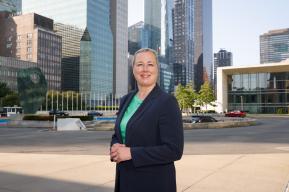Idea
The United Nations stands with teachers and calls for action to strengthen the profession

The United Nations High-Level Panel on the Teaching Profession just launched a set of recommendations which seek to strengthen the profession and ensure that teachers are valued and respected. It is now incumbent upon Governments to implement these recommendations for every child to be taught by a qualified teacher every day, every lesson. Education unions are ready to do their part.
Some headlines have become a familiar part of our news landscape: More and more teachers forced to leave the profession they love, fewer people joining the profession the world needs, teachers burning out, students missing out.
The growing and alarming shortage of 44 million teachers worldwide itself is not news. In many countries, unions have raised the alarm for years. It took a global pandemic that caused unprecedented disruption to education everywhere to drive home the gravity of the situation and prompt real action. It also took tireless advocacy from Education International and our member organizations across the world.
Now, the United Nations High-Level Panel on the Teaching Profession convened by Secretary General António Guterres has released the unanimous recommendations of a global group of ministers of education, former presidents, academics, representatives from civil society, teachers and students and their unions. The Panel’s unprecedented call to action is as significant and comprehensive a roadmap to transformation ever to come from an official international body.

Bold recommendations to transform education
The Panel’s 59 recommendations are ambitious and progressive, recognizing that the future of humanity depends on effective public education delivered by a strong and valued education workforce. As Secretary General Guterres said at the release of the Panel’s recommendations, “Just as teachers support us all, it’s time to support teachers. Let's make sure they have the support, recognition, and resources they need to provide quality, relevant education and skills for all.”
The Panel states that investing in teachers is the most effective strategy to build quality and resilient education systems. This means ensuring competitive, fair, and professional salaries, in line with other professions with similar educational requirements. It also means good working conditions for the education workforce, including education support personnel. Teachers need manageable workloads and student-teacher ratios that allow for quality teaching and learning to happen.
The recommendations also issue a clear call to make sure that educational working environments are inclusive, safe, and non-discriminatory for teachers. Teachers must be protected against all forms of violence, discrimination and harassment, and that includes gender-based violence. Gender pay equity is fundamental and women’s leadership must be encouraged.

Teacher professionalism is recognized and encouraged throughout the recommendations. The Panel recommends that countries ensure that all teachers have a university degree and access to quality initial teacher training and quality continuous professional development that is equitable, free, part of official duties and co-designed with the profession.
Respecting and valuing teachers also means involving them in policymaking. The Panel is clear: the expertise and insights of teachers must inform and shape the policies that affect education. Teachers and their organizations must be at the table when decisions are made. Social and policy dialogue, including collective bargaining, feature heavily in the recommendations as the main mechanism for determining working conditions and education policies.
The Panel’s recommendations on financing education also rise to the challenge. Public education must be protected from austerity measures. Notably, the Panel calls on international financial institutions, which include the World Bank and the International Monetary Fund, to end all measures that limit education spending and teacher salaries and that have long undermined every student’s right to a qualified teacher.
Teachers working in emergency contexts were not forgotten. The Panel calls on the international community to establish a Global Fund for Teachers’ Salaries. The Fund would make sure teachers working in crises receive fair salaries regularly and on time, because their work to teach and support the most vulnerable children in the harshest of circumstances is vital.

From recommendations to action
The Panel’s recommendations are the result of global education cooperation. They echo many longstanding education union demands and offer real solutions to the challenges the profession faces every day. But the recommendations can only become reality if governments and education unions work together.
The recommendations call for the creation of national commissions that bring together teacher unions and governments to address the teacher shortage and monitor the implementation of the recommendations. Education unions are ready to be part of these commissions and contribute to their work to truly transform education and effect real change for millions of teachers and students around the world. Governments must step up and answer this call to action.
The Education International is a member of the SDG4 High-Level Steering Committee
Chaired by President Gabriel Boric of Chile and Audrey Azoulay, UNESCO’s Director-General, the HLSC aims to speed country-level progress towards SDG4. Its membership is representative of the global education community, with a ‘Leaders Group’ of 28 Ministers, Heads of Agency, and organizational leaders, and a corresponding ‘Sherpa Group’ of senior technical representatives. The latter will provide strategic support to the Leaders Group and will lead the technical work on the three HLSC’s Functional Areas, with support of and coordination by with the Inter-Agency Secretariat (IAS).










